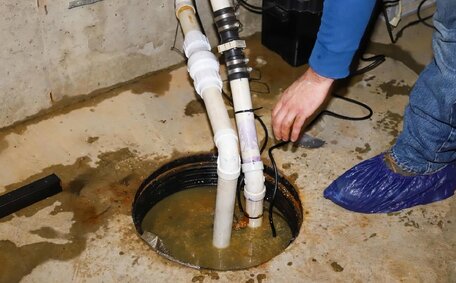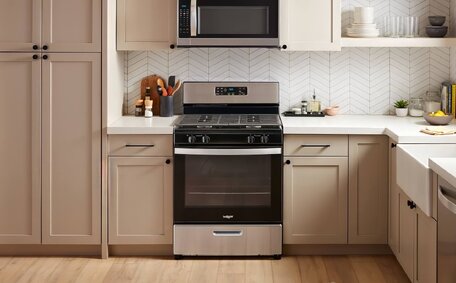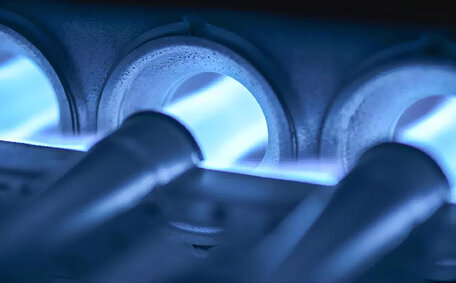What causes rusty brown water coming from taps?
There are several causes for brown tap water, including:
- Corrosion in iron-containing plumbing systems and fixtures - Aging hot water systems and pipes may begin to corrode, leading to discolouration.
- Sediment accumulation - Over time, rusty particles and mineral sediment from inside pipes and your water heater can dislodge and enter your tap water.
- Nearby construction activities - Construction can disrupt and stir up sediment in the water main, temporarily affecting your water quality
- Issues with your water supply or treatment - Changes and disruptions in public water supplies which a plumber can also investigate, may lead to temporary discoloration
Often, running your taps for a period can eliminate rust or sediment build-up. If the water remains discoloured after the pipes are cleared of rust, it’s advisable to contact a plumber for a system inspection.
Health concerns with drinking rusty water
While discoloured or rusty water may raise concerns, it is typically not harmful. Rust originates from iron particles leaching into your tap water from household pipes, often imparting a metallic taste. Consuming excessive iron from your water over time can result in stomach discomfort and constipation.
Issues with rusty pipes can also introduce sediment that clouds the water and leaves rust stains on fixtures, laundry, and plumbing equipment. Despite its unsightly appearance, this kind of rust in tap water is generally safe to consume.
Those with compromised immune systems or specific health conditions should avoid drinking brown tap water until it’s tested.
For a simple fix to your brown water issue, letting the tap run for a few minutes often helps to clear any sediment. Should you notice brown water not clearing up, you might need to get rid of the brown discoloration by installing a water filtration system or contacting a professional.
Checking your pipes and water heater for rust
To inspect your pipes and water heater for corrosion, follow these steps:
- Inspect all accessible joints, valves, and fixtures for signs of rust, corrosion, leaks, or discolouration. Pay close attention to older galvanised steel or cast iron pipes.
- Check around the base of your water heater for rust trails or stains. Remove the cover and shine a flashlight inside to also check the condition of the anode rod for any rust issues.
- Drain around 4 litres from the water heater using the bottom tap, and have a container ready to catch the water. If sediment-rich, discoloured water is an issue your tank is facing when draining, it suggests internal rust.
- If you haven’t flushed your water heater in the past year, now is a good time. Follow the manufacturer’s instructions to flush out sediment that may harbour rust particles – ensuring your water is safe for drinking.
- If you detect rust or corrosion, consider replacing affected pipes, valves, and the entire water supply pipe. Galvanised steel pipes have a lifespan of 40-50 years so may need replacement in older homes.
- If rust problems persist after inspecting the water system, it’s time to call your local plumber to conduct further testing or pipe maintenance.
Managing factors that influence your plumbing can prolong its life and improve water quality.
Getting your household water supply tested
It’s important to test the water supply within your household if your tap water looks persistently rusty or discoloured within a few days. Testing helps determine the reasons for brown water, be it from corroding pipes or contamination in the water supply.
In the Paddington area, a licenced Sydney Water plumber like Paddington Plumbing can arrange for a source your full water quality test. This will specifically test for levels of iron manganese, sediments, and microorganisms from when water comes into your household. It determines if contamination exceeds safe standards for drinking water.
You may need a water test if:
- Your water is persistently brown or yellow in colour
- There is a metallic taste from the brown tap water
- You have very old pipes that may be corroding
- Nearby construction work has impacted your water quality
Based on test results, solutions such as pipe replacements, water treatments, filters, or routine flushing may be recommended. Temporary discoloration from sediment or supply disruptions typically resolves after running the taps for a short time.
For peace of mind about the quality and safety of the water your household uses, contact the professional team at Paddington Plumbing today to arrange testing.
DIY options for filtering rusty water
There are a few DIY methods you can try at home to filter out rust particles from your water supply on a temporary basis:
Flush pipes by running taps
Run both hot and cold taps at full force for 5 to 10 minutes. This action may help dislodge sediment that comes out of your faucets, addressing blockage issues within your plumbing system. Pay special attention to taps closest to the water mains entry to ensure the water flowing to your home is clear.
Use sink strainers
Fit cost-effective strainers or filters to your showerheads and faucets to trap sediment and maintain water clarity. These devices can capture rust particles which cause brown water from your hot tap and reduce the discolouration, but they do not remove contaminants.
Filtered water pitchers
Consider using filtered water pitchers to remove sediments, leaving dirty tap water looking cleaner. These pitchers use filters made of carbon or ion exchange resins.
Install filters at points of use
For sinks or appliances with issues, attach small filters to the hot water lines. Countertop filters, faucet mounts, in-line pipes water filters under sinks, refrigerator filters, and whole-house filtration systems are options depending on your budget.
While these filters are helpful, they do not address the underlying issue of internal rusting in plumbing pipes. For persistent issues, Considering plumbing repair to fix brown water your areas, as the underlying cause might require a professional’s touch.
Calling a professional plumber for recurrent rusty water
If you have attempted DIY methods for clearing rusty water but find the issue keeps recurring, it’s a sign of an underlying problem that needs professional attention. Continued discolouration, particularly when accompanied by changes in pressure or taste, suggests issues such as corroded pipes or sediment buildup that standard filters may not resolve.
Paddington Plumbing are specialists in dealing with rusty water problems. If you experience any of the following, it may be time to contact an emergency plumber. Reach out to our team for a prompt appointment or immediate troubleshooting:
- Water still appears rust-coloured even after you’ve let the taps run for several minutes
- There is a significant pressure drop at affected taps
- You find rust sediment or particles in the water
- DIY methods including tap flushing provide only temporary improvement
A thorough inspection of your pipes and customised water testing will pinpoint the root cause and inform recommendations on replacements, treatments, or maintenance. This avoids wasted time, money and water due to ineffective, short-lived fixes.
For a lasting solution to ongoing rusty water issues, contact Paddington Plumbing on 1300 349 338 or at [email protected] to schedule an appointment with our licensed technicians.
Preventing future rusty water issues
Sydney homeowners can take several proactive measures to prevent rusty water:
Conduct regular pipe inspections
Inspect all visible pipes and plumbing fixtures once a year for early signs of wear, corrosion or rust buildup. Address any leaks or damage to pipes within your property promptly before major issues occur.
Consider pipe upgrades
For galvanised steel or cast iron pipes over 50 years old, consider their replacement with copper or PEX pipes to ensure consistent water flow and prevent future leaks or rust.
Flush pipes after heavy rain
If your property shares pipe connections or main lines, run the taps to clear any sediment that might have been disturbed by heavy storms or drainage runoff.
Install a water softener
Water softeners remove mineral deposits from pipes, ensuring clean water your tap is flowing out and reducing rust and scale buildup over time. Water softeners effectively prevent scale from entering your plumbing system.
Practise preventative maintenance
Routine maintenance such as replacing worn washers, clearing drains, and monitoring water pressure can notably reduce the risk of rust in your tap water.
Paddington Plumbing’s licensed technicians can recommend the best preventative measures for problematic pipes in your home’s plumbing. Contact us today to schedule annual check-ups, pipe inspections or upgrades to keep water running clean for years to come.






